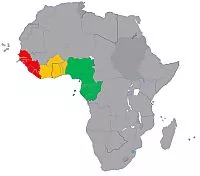Who: Water Aid; an international organisation that assists communities to access safer water, hygiene and sanitation1; Joe Lambongang, Acting Country Director WaterAid Transboundary – Liberia
What: Both Liberia and Sierra Leone were declared Ebola free last year, but WaterAid, a British Non-Governmental Organisation (NGO) has warned that both countries might experience an epidemic similar to that of Ebola in terms of severity of the impacts "if we do not see action to improve water, sanitation and hygiene practices in our communities, schools and healthcare facilities," WaterAid's Joe Lambongang announced in a statement2. The Chairman of the Liberia WASH Civil Society Organisations Network, Mr Prince Kreplah commended the government for improving health care facilities and also highlighted the fact that more needed to be done in terms of WASH in the country3. In Liberia, WaterAid provided 13,000 people with safe water last year, and 11,000 people with improved sanitation4. Dr Francis Kateh, the Deputy Minister of the Health of Liberia thanked WaterAid for all the effort they have made in improving WASH in the country.
When: WaterAid and other Water Sanitation and Hygiene (WASH) stakeholders presented a joint communique to the Liberian Ministry of Health on 8 August 2016.
Where: The communique was presented to the Deputy Minister of Health Dr Francis Kateh at the Ministry of Health in Liberia.
Why: According to WaterAid, 4 million Liberians do not have access to proper sanitation and 1 million Liberians are without access to safe water5 while in Sierra Leone 5 million people do not have access to proper sanitation and 2 million people don't have access to safe water6. Songhai Consultant based in Monrovia attests to this, saying that "the quality of water services in Liberia is poor and makes the country vulnerable to water-borne disease".
Outlook: One of the serious matters arising from an absence of proper sanitation is the conundrum of getting proper waste management facilities. At the end of the civil war, the Liberian Government had plans to establish certain institutions to deal with water and sanitation. For example it intended to create a ministry of Water Resources and Sanitation in 20077. But til date, such a ministry does not exist. That could be one of the main reasons why a significant proportion of the population lacks access to proper sanitation and safe water; the lack of a designated institution or ministry8. However, with the Liberian president now as an ambassador of WaterAid and given the damning findings of the report, there will likely be increased pressure on the government to make significant improvements.
Footnotes
1 WaterAid. http://www.wateraid.org/us/what-we-do
2 http://www.news24.com/Africa/News/sierra-leone-liberia-risk-ebola-like-outbreaks-from-poor-sanitation-20160810
3 Front Page Africa. WaterAid Urges Liberian Government to Deliver on WASH promises. 2016 http://www.frontpageafricaonline.com/index.php/health/1684-wateraid-urges-liberian-government-to-deliver-on-wash-promises
4 WaterAid. Liberia. http://www.wateraid.org/us/where-we-work/page/liberia
5 WaterAid. Liberia. http://www.wateraid.org/us/where-we-work/page/liberia
6 WaterAid. Sierra Leone. http://www.wateraid.org/us/where-we-work/page/sierra-leone
7 The Government of Liberia. Liberia WASH Compact Review Report, 2012 file:///C:/Users/ALI%20BALOGUN/Downloads/Liberia-WASH-compact-review.pdf
8 Liberia Anti-Corruption Commission. List of Ministries. 2016 http://www.lacc.gov.lr/public/index.php/lacc-links/ministries2
The content of this article is intended to provide a general guide to the subject matter. Specialist advice should be sought about your specific circumstances.



